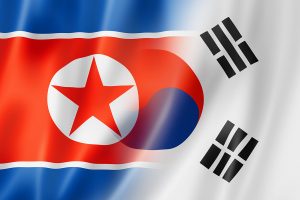What does DPRK mean? What is the DPRK meaning? What does DPRK stand for? So, you have North Korea and South Korea. Or the DPRK, and the ROK. For South Korea, ROK means Republic of Korea. So, what does the DPR bit of DPRK mean?
When you travel anywhere in the world, it’s important to respect local norms and traditions: don’t disrespect the King in Thailand, don’t bare your soles in the Middle East, don’t suggest that guns are bad mmmkay in America, and don’t say “North Korea” in North Korea.
There are a few reasons why they don’t like tourists using this moniker: firstly it suggests that, heavens forfend, there are two Koreas. Secondly, both Koreas (we mean the two parts of the same Korea) both claim sovereignty over the whole of the Korean Peninsula. And lastly the official title of North Korea is the DPRK, or to give it its full title: the Democratic People’s Republic of Korea – (Korean: 조선민주주의인민공화국, Chosŏn Minjujuŭi Inmin Konghwaguk).
Table of Contents
What does DPRK stand for?

DPRK Meaning – Democratic
What does DPRK stand for? The D stands for ‘Democratic’: This might be a strange concept for those of us in the west who view “democratic” to mean pluralistic elections, but in socialist parlance Democratic refers to the democracy delivered by the vanguard party, and the dictatorship of the proletariat. Democracy is everyone being equal. It is also known as democratic centralism, to avoid factionalism.
DPRK Meaning – People’s
What does DPRK stand for, the P means People’s. ‘People’s’: The leading party – in this case the Workers’ Party of Korea – acts as the vanguard party for the people, and against the interests of business.
As a s socialist state, it is a state for and run by the people of the country. Therefore “People’s” has been used in the names of many communist states. One other current example is the Laos People’s Democratic Republic.
Meaning of the DPRK – Republic?
Meaning of DPRK – the R is for Republic.‘Republic’: the literal definition of a republic is “a state in which supreme power is held by the people and their elected representatives, and which has an elected or nominated president rather than a monarch”. Some might therefore argue that since the succession of power in the DPRK is de facto hereditary, it’s not actually a republic. The Kims do not, however, have royal titles, and receive their power through the state institutions of the DPRK. That they are related is not part of the state institutions of the Republic, nor the constitution.
Why do we call Korea, Korea?
Meaning of DPRK – The K stand for Korea, but why do we call it Korea when they do not? ‘Korea’: Korea is the English transliteration of the country’s former name, when it was ruled by the Koryo Dynasty. This is why some companies use the name ‘Koryo’. Koryo morphed into Korea, and although neither Korean state calls themselves Koryo, the English translation is still Korea.
What does DPRK stand for?
Put it all together and what have you got? The DPRK meaning! The Democratic People’s Republic of Korea, or the DPRK. Remember this when you visit the country; your guides will be very impressed with your knowledge and cultural sensitivity towards the people north of the 38th parallel!
What does DPRK stand for in Korean?
Wat does DPRK stand for in Korean? Well essentially the same thing, but we will break it down a bit in the interests of this article.
DPR Korea; Korean: 조선민주주의인민공화국. or in our script Chosŏn Minjujuŭi Inmin Konghwaguk. In North Korea Chosin (Joseon) is what they call the country. Minjujuŭi losely translated to democracy, or democratic . Inmin means people, or “the people”, with Konghwaguk. being republic. So, Korean Democratic Peoples Republic.
To read about what Koreans call Korea click here.
And that is the story of the meaning of the DPRK and why, technically at least there is no such country as North Korea!
To learn more about the Democratic People’s Republic of Korea join one of our many tours!





